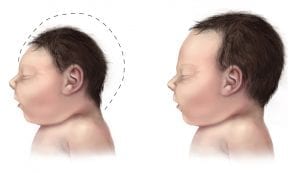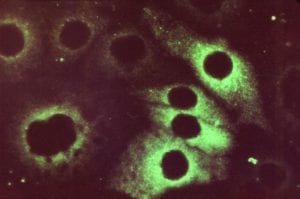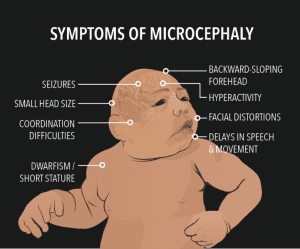What Is Microcephaly?
To mothers, their children–especially the newborns–are their treasures who need protection. Unfortunately, no matter how much a parent wants to do that, there are times when the baby will become vulnerable to diseases even at a very young age. One of these diseases is microcephaly.

Microcephaly is present when the head of a baby is too small and does not fully develop. It is a rare disorder within the nervous system. It can usually happen while the baby is still in the womb or within the first few years of birth.
2 Vital Facts About Microcephaly: Congenital And Acquired
Knowing how your baby can contract this disease is challenging, so your doctor may not be able to give an exact reason. But here are some possible causes:
- Congenital microcephaly
- Acquired microcephaly
Congenital microcephaly takes place when a baby develops the disease because of genetic complications. It happens when flaws in the genes are linked to the brain development of the baby. Children with other genetic disorders like Down Syndrome are also observed to have microcephaly.
Acquired microcephaly transpires when the disorder is acquired by getting into contact with harmful elements within the baby’s environment. This can happen because of the following:

- Viral infections (e.g., Zika, Rubella, and many more)
- Infections due to parasites like toxoplasmosis
- Exposure to toxic chemicals like lead and mercury
- Malnutrition
- Alcohol
- Drugs
On the other hand, congenital microcephaly can happen because of the following:
- Hemorrhage or stroke in the baby
- Brain injury after birth
- Spine or brain defects
How Can A Doctor Know That A Baby Has Microcephaly?
Although the doctor may not be able to pinpoint the exact cause of this disorder, they can diagnose if your baby has it even before being born.

Before the baby is born, the doctor can diagnose if the baby has microcephaly through ultrasound and see if the size of the baby’s head is smaller than expected. For mothers, it is highly recommended to have an ultrasound or a test, which can provide a wealth of sonogram facts, at the end of the 2nd trimester. It is usually during the last three months of pregnancy.
To diagnose microcephaly post-birth, it usually happens through physical measurements. Nurses or healthcare workers will measure the head of the baby. They typically measure the fullest part and take note of it in a chart to measure the baby’s growth. It can then be used to check how the baby’s head is growing as compared to how other baby’s heads of the same age and sex are growing. If the head measurement is lower than what is considered as average, your baby may be diagnosed with microcephaly.
The head measurement is done every time the child is taken for a checkup until they reach 2 or 3 years old. The doctor will most likely measure your child’s head every time you visit if they had been diagnosed with microcephaly.
What Are The Symptoms Of Microcephaly?
One of the most common and readily visible symptoms of microcephaly is having a small head. Other than that, there are usually no other problems. The head will still grow as the child develops in age, but the size will be considered smaller than average or regular.

Some kids will have average intellect, but others will also have difficulty learning. You don’t have to worry about this because it won’t get any worse as they grow older. Usually, the challenge in education happens to young children.
The child may also experience other symptoms like:
- Problems with balancing themselves and coordinating
- Developmental delays (delayed sitting, standing, walking and learning)
- Trouble swallowing and problems with feeding
- Hearing loss
- Hyperactivity
- Seizures
- Short height
- Difficulties in speaking and pronunciation
- Vision problems
How Is Microcephaly Treated?
There is no cure for microcephaly. However, the problems with development and behavior caused by the disease can be treated.
It’s best to take your child with microcephaly to a specialist regularly for checkups. In this way, their growth and development can be monitored, and irregularities will be easy to spot with regular monitoring.
However, some children experience severe cases of microcephaly. They need constant treatment to keep extreme and dangerous symptoms in check. One of those symptoms is seizures. Talk to your doctor about possible treatments that can help improve your child’s condition.
The treatments can be:
- Medicines to improve their nerve and muscle function and control seizures and hyperactivity
- Speech therapy
- Physical and occupational therapy
What Are The Long-Term Effects Of Microcephaly?
The long-term effects of microcephaly will depend on what has caused the disorder in the first place. If your child only has mild microcephaly, they may not have other serious problems. Despite their head being smaller than the standard size, they can still achieve the milestones of growth for their age.
On the other hand, some children experience serious issues or even medical problems like cerebral palsy or epilepsy.
Can It Be Prevented?
For pregnant mothers, take note of these tips to prevent acquired microcephaly:

- Have healthy meals and take prenatal vitamins.
- Don’t drink alcohol or do drugs.
- Avoid chemicals.
- Practice good hygiene like washing hands and go to the doctor immediately if you feel sick.
- Avoid touching litter boxes or feces as they can promote toxoplasmosis.
- Use insect repellent that is safe for pregnant women.
If you have a child who has microcephaly, and you want to get pregnant again, then genetic counseling is imperative to trace the risk of the disease in your genes.
Where Can I Find Support?

Never forget that there are people around you always ready to provide support for you and your child. You can obtain this support from your friends and family. It is also possible to contact other parents or mothers who have been in your position before and who have children with microcephaly. You can reach out to Foundation for Children with Microcephaly – search for it online. This way, you can understand the disease better and try to live as frequently as possible.
FAQs
What is microcephaly?
Microcephaly is where an infant’s head is much smaller than expected.
What causes microcephaly?
Microcephaly may be due to genetic abnormalities. Sometimes, it can be due to drugs and alcohol. It can also happen when the fetus during pregnancy got exposed to certain viruses and toxins
Do babies with microcephaly survive?
There is no usual life expectancy for children with microcephaly. Cases vary.
Does microcephaly cause retardation?
Yes, microcephaly can cause intellectual disabilities like mental retardation. In some cases, it severely supports vision and hearing problems. Children may also suffer from other problems associated with the abnormalities of the child’s brain.
Can a child with microcephaly be healthy?
A child with microcephaly can become mentally disabled. However, it is not always that way. Some children with small heads have an average IQ.
How does microcephaly affect a child?
A child can suffer from microcephaly after birth. Prenatal infections and susceptibility to certain viruses can also become a cause.
At what age is microcephaly diagnosed?
The diagnosis of the condition of Microcephaly in a child is usually at birth. Sometimes at a later stage.
Does microcephaly run in families?
Exposure to harmful substances during fetal development can cause Microcephaly. But in most cases, it associates with genetic problems.
How to know if your child has microcephaly?
The circumference distance around a child’s head will determine the condition.
How can you prevent microcephaly?
You can acknowledge these suggestions to prevent microcephaly from happening. Avoid drinking alcohol and don’t do drugs. Maintain a healthy diet and take prenatal vitamins regularly.
How soon can microcephaly be detected?
Microcephaly can be recognized as immediate as 18-20 weeks gestation.
Can macrocephaly be cured?
Honestly, the infant condition will not always require treatment. However, in some unfavorable situations, if the issue is due to genetics, it may require life-long support.
Last Updated on May 14, 2023 by Harold Chan
DISCLAIMER (IMPORTANT): This information (including all text, images, audio, or other formats on FamilyHype.com) is not intended to be a substitute for informed professional advice, diagnosis, endorsement or treatment. You should not take any action or avoid taking action without consulting a qualified professional. Always seek the advice of your physician or other qualified health provider with any questions about medical conditions. Do not disregard professional medical advice or delay seeking advice or treatment because of something you have read here a FamilyHype.com.